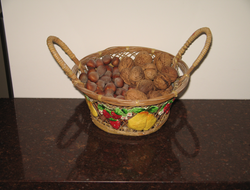Nuts and seeds: Tasty components for your eating for health plan
Published: September 21, 2018
Fairly generous portions of nuts and seeds are often included in vegan and vegetarian diets.
However, the inclusion of these nutritious food items in an omnivore diet is frequently viewed with extreme caution if not fear.
This cautionary approach to nut and seed consumption may have been ignited by the prevalence of low fat and low calorie diets.
These diets tend to severely limit or entirely exclude nuts, seeds, and products such as nut and seed butters from a diet plan.
During the early 1990s research suggested that high intake of dietary fat was associated with an increased risk of heart disease and may also contribute to the increasing number of people who were overweight or obese.
It was recognised at that time that people who followed vegan or vegetarian diets tended, in general, to have a lower incidence of heart disease.,
Although, potentially only certain types of fat contribute to increased risk, the message that was communicated to the public was to reduce dietary fat of any type.
From a weight loss perspective, low calorie or calorie restrictive diets usually exclude foods that are energy dense (lots of calories for a small amount of food) regardless of whether they are nutrient rich or not.
Nuts and seeds with an average calorie content of 200 kcals per ¼ cup would be considered energy dense.
As part of a 1200 calorie diet (typical intake for many popular diets) a ¼ cup of almonds would account for one sixth of your food intake or 16.67% of your daily food allowance.
A cup and a half of almonds would take up your entire food allowance for the day! And a cup and a half of nuts is not so very difficult to eat!
However, in the past two decades research consistently indicates that the addition of nuts and seeds to your diet, albeit in small amounts, can have beneficial healthful consequences.
Understanding the nutritional properties of nuts and seeds, and associated products, and how these properties can benefit your health may provide you with the knowledge to determine whether or not nuts and or seeds can be beneficially included in your eating for health plan.
Nuts and seeds: What are they?
In botanical terms “true” nuts are fruits that comprise a seed and a hard shell which does not open to release the seed (indehiscent).
However, a less restrictive definition which is commonly used includes any...link to the full article to learn more about nut and seed nutrients and health benefits.
References
1.
Whitney, E. & Rady Rolfes, S. (2005). Understanding Nutrition. Belmont, CA: Thomson Wadsworth
2.
Centre for Science in the Public Interest:Nutrition Action Health Letter (July/August 2014, May 2013, March 2014, September 2012, January 2014, September 2010, October 2013, October 2009)
4.
Beyer, P. (2004). Medical Nutrition Therapy for Lower Gastrointestinal Tract Disorders. In Mann. K. & Escott-Stump, S. (Eds.)(2004). Krause's Food, Nutrition & Diet Therapy. (11th Ed.) Elsevier

